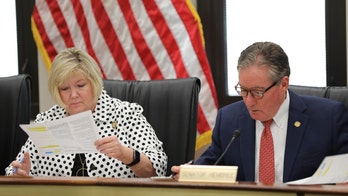
AP file image (AP2010)
Former President Bill Clinton says he'd use the 14th Amendment to raise the debt ceiling if he was in President Obama's position, "if it came to that," and no deal was reached.
"[W]ithout hesitation, and [I would] force the courts to stop me" Clinton said in an interview with The National Memo Monday night.
"I think the Constitution is clear and I think this idea that the Congress gets to vote twice on whether to pay for [expenditures] it has appropriated is crazy," he added.
Section 4 of the 14th Amendment, which was ratified on July 9, 1868, notes, "The validity of the public debt of the United States, authorized by law, including debts incurred for payment of pensions and bounties for services in suppressing insurrection or rebellion, shall not be questioned."
Some say the take away from that line is that the president can then deem the debt ceiling as unconstitutional and in a sense, just ignore it.
Ultimately the former president said he thinks congressional leaders and the White House will reach a deal. "It looks to me like they're going to make an agreement, and that's smart," Clinton said.
Clinton said raising the ceiling "is necessary to pay for appropriations already made."
"The reason that raising the debt limit is so unpopular is that people think you're voting to keep [increasing] deficit spending, instead of voting to honor obligations that were already incurred," Clinton said in the interview.
He also reflected about his time in office when the issue came up. "I think [the Gingrich Republicans] figured I'd be smart enough to explain to the American people that they were refusing to pay for the expenses they had voted for when Ronald Reagan and George H.W. Bush were president. And that would make ‘em look bad."
When asked a Twitter town hall on July 6 about potentially issuing an executive order to raise the debt ceiling pursuant to the 14th amendment, President Obama provided a vague response.
"I don't think we should even get to the constitutional issue. Congress has a responsibility to make sure we pay our bills. We've always paid them in the past. The notion that the U.S. is going to default on its debt is just irresponsible," he said.
The Treasury Department openly clarified its position earlier this month.
Treasury's General Counsel George Madison submitted a letter to the New York Times on July 8 in response to an op-ed about the 14th amendment. The letter said that Secretary Geithner has never argued that it "allows the president to disregard the statutory debt limit."
It went on to say, "the secretary has cited the 14th Amendment's command that "[t]he validity of the public debt of the United States... shall not be questioned" in support of his strong conviction that Congress has an obligation to ensure we are able to honor the obligations of the United States. Like every previous Secretary of the Treasury who has confronted the question, Secretary Geithner has always viewed the debt limit as a binding legal constraint that can only be raised by Congress."




